Effective time management is crucial for enhancing productivity in both personal and professional settings. Begin by setting clear, achievable goals using the SMART criteria to guide your focus. Prioritize tasks by distinguishing between urgent and important activities, employing tools like the Eisenhower Matrix. Create a structured daily schedule and incorporate time-blocking techniques to maintain concentration. Consider utilizing time-tracking tools to monitor progress and identify efficient practices. Additionally, develop strategies to overcome procrastination, and delegate tasks to empower team members. By adopting these strategies, you can significantly boost productivity and overall satisfaction in your work and life balance. There’s more to explore on this journey.
Key Takeaways
- Set clear and achievable goals using the SMART criteria to maintain focus and direction in your tasks.
- Prioritize tasks effectively by distinguishing between urgency and importance using the Eisenhower Matrix.
- Utilize daily scheduling techniques to create a structured roadmap, incorporating breaks for sustained energy and productivity.
- Employ time-tracking tools to enhance awareness of time allocation, facilitating better decision-making and progress measurement.
- Delegate tasks to focus on core responsibilities, improve team morale, and increase overall productivity.
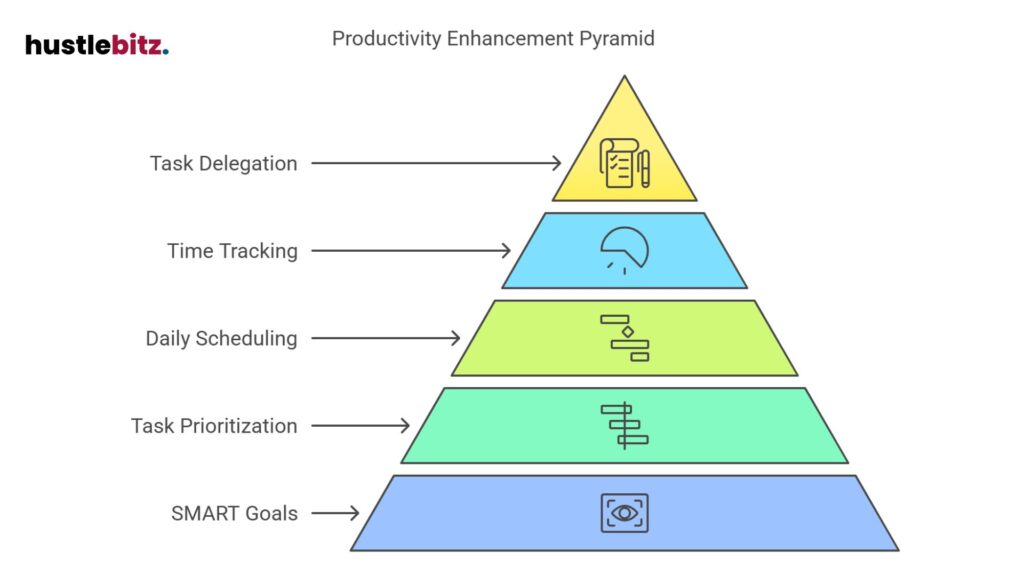
Understanding Time Management and Its Importance
Time management is a crucial skill that enables individuals to effectively allocate their time, prioritize tasks, and enhance overall productivity in both personal and professional spheres. Understanding the importance of time management is essential for anyone seeking to navigate the complexities of daily life and achieve their goals efficiently. It allows individuals to focus on high-priority activities, thereby maximizing their effectiveness and reducing stress.
Effective time management involves organizing and planning how much time to spend on specific activities. By developing strong time management skills, individuals can improve their productivity significantly. This process includes setting deadlines, creating schedules, and breaking tasks into manageable chunks, which collectively contribute to a more structured approach to work and personal responsibilities.
The benefits of time management extend beyond mere productivity. When individuals practice effective time management, they often experience a greater sense of control over their lives, leading to reduced anxiety and improved mental well-being. Moreover, the ability to allocate time wisely allows for a better work-life balance, fostering both professional achievements and personal fulfillment.
Setting Clear Goals to Enhance Productivity
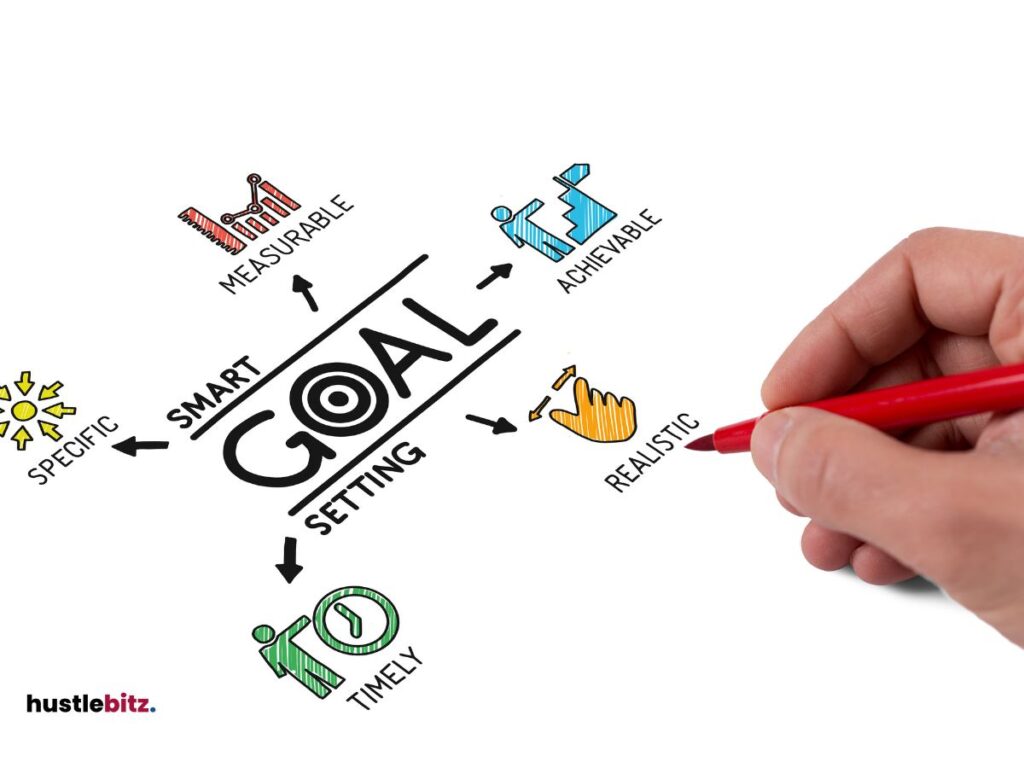
Establishing clear goals is fundamental to enhancing productivity, as it provides direction and focus for individuals navigating their tasks and responsibilities. A well-defined goal acts as a roadmap, guiding actions and decisions while minimizing distractions. By employing effective time management skills, individuals can enhance their ability to achieve these goals, ensuring that efforts align with desired outcomes.
To boost productivity, it is essential to set SMART goals—specific, measurable, achievable, relevant, and time-bound. This approach enables individuals to break down larger objectives into manageable tasks, thus simplifying the execution process. Additionally, incorporating regular reviews of these goals allows for adjustments based on progress and changing circumstances.
Implementing strategies to improve goal-setting can significantly impact overall productivity. For instance, utilizing visualization techniques helps maintain motivation and clarity. Furthermore, sharing goals with others can create a sense of accountability, driving individuals to stay committed to their objectives.
Time management helps you prioritize these goals, ensuring that the most critical tasks receive the attention they deserve. By allocating time effectively and avoiding procrastination, individuals can focus on high-impact activities that contribute to their overall success.
Prioritizing Tasks Effectively
Effective prioritization of tasks is crucial for maximizing productivity and ensuring that essential responsibilities are addressed in a timely manner.
To prioritize tasks effectively, individuals must employ sound time management strategies that allow them to distinguish between urgent and important activities. This practice not only enhances effective time management but also leads to several benefits that can significantly improve productivity.
Here are some strategies to prioritize tasks effectively:
- Identify urgent vs. important tasks: Distinguish between tasks that require immediate attention and those that are significant for long-term goals.
- Utilize the Eisenhower Matrix: Categorize tasks into four quadrants based on urgency and importance to clarify what needs to be done first.
- Set deadlines: Assign realistic deadlines to each task to encourage accountability and focus on completion.
- Review and adjust priorities regularly: Regularly assess your task list to accommodate changes in project status or new responsibilities.
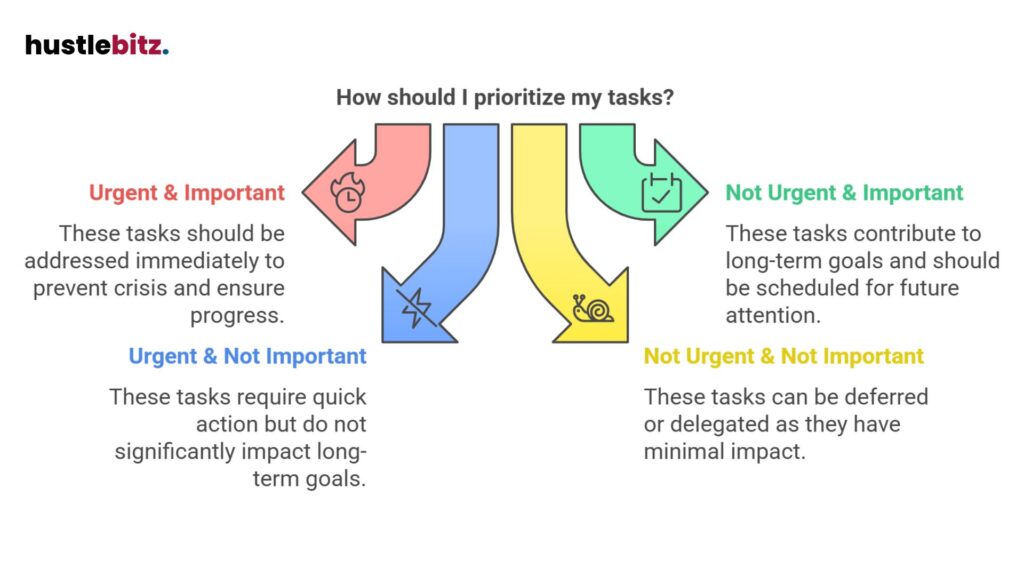
Creating and Sticking to a Daily Schedule

A well-structured daily schedule serves as a roadmap for productivity, guiding individuals through their tasks while minimizing distractions and enhancing focus.
Creating a daily schedule is one of the most effective time management tips available, enabling you to manage your time effectively and allocate specific periods for each task. Start by listing all tasks you need to accomplish, categorizing them based on urgency and importance, which allows you to prioritize effectively.
Once you have your list, break down larger projects into smaller, manageable tasks. Assign realistic time frames for each task, ensuring you incorporate breaks to maintain energy and concentration levels. This approach not only fosters good time management skills but also helps in creating a sense of accomplishment as you check off completed items.
Consistency is key in sticking to your schedule. To reinforce this habit, review your schedule at the end of each day, adjusting it as needed for the following day. This practice not only enhances your practical time management skills but also allows you to reflect on what worked and what didn’t, leading to continuous improvement.
Utilizing Time-Tracking Tools to Monitor Your Progress
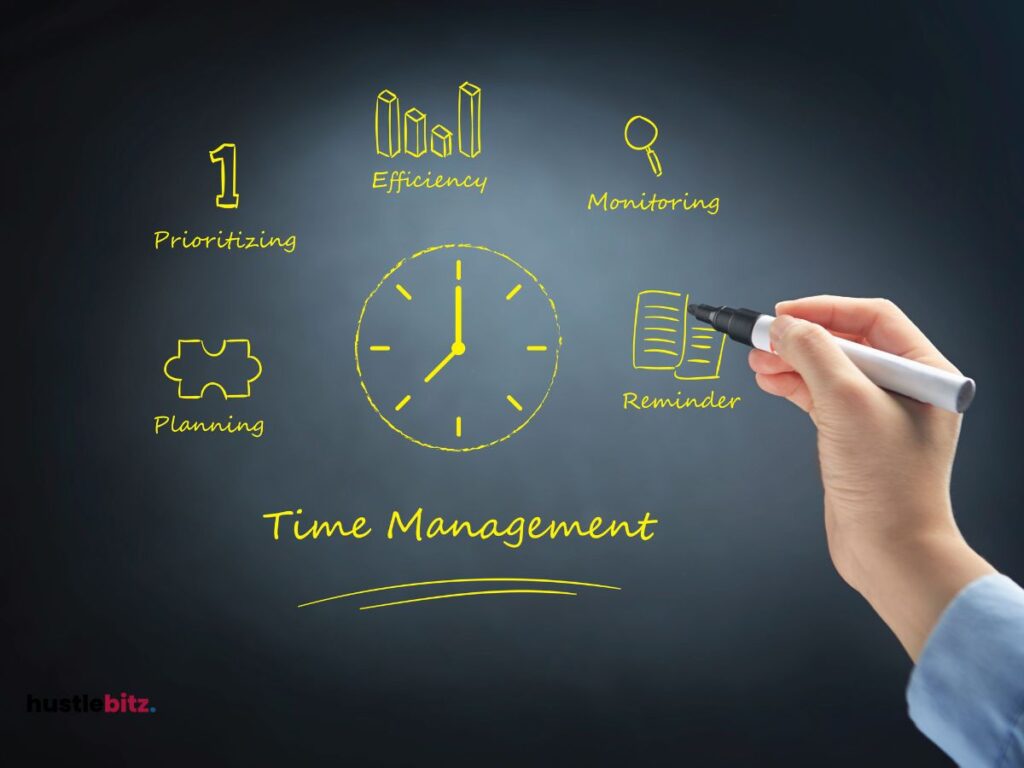
Incorporating time-tracking tools into your routine can significantly enhance your ability to monitor progress and optimize productivity. These tools provide valuable insights into how you allocate your time, enabling you to identify areas for improvement and adopt effective time management strategies. By utilizing time tracking tools, you can not only boost your productivity but also foster a healthier work-life balance.
Here are some key benefits of implementing time tracking tools:
- Enhanced Awareness: Understand where your time is spent, allowing for better decision-making regarding task prioritization.
- Goal Tracking: Set specific goals and measure your progress against them, facilitating a clearer path toward achieving desired outcomes.
- Efficiency Identification: Discover which activities yield the best results, enabling you to focus on strategies that work for you.
- Improved Time Management Skills: Regularly reviewing your tracked data helps refine your scheduling techniques and enhances your overall efficiency.
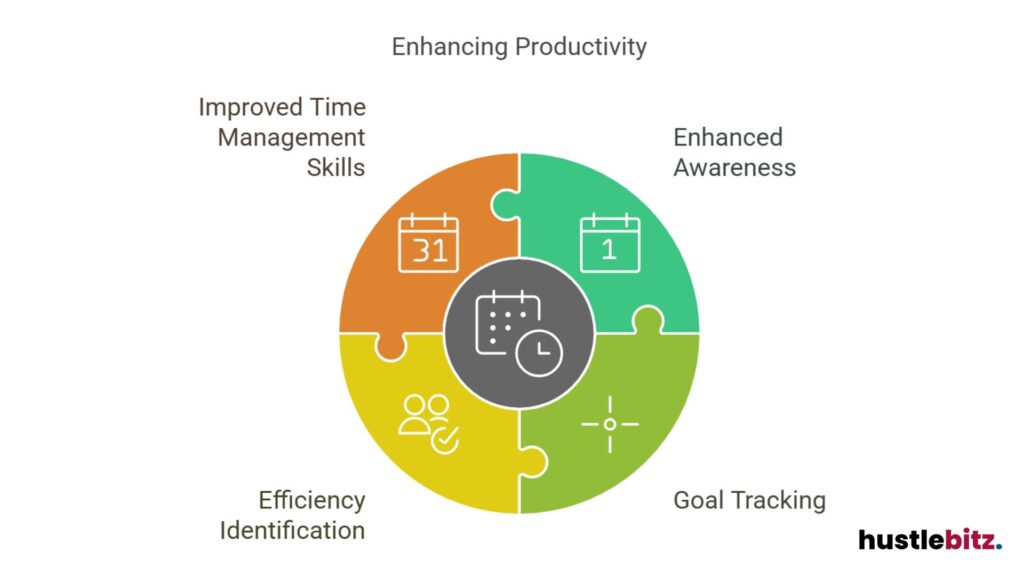
Overcoming Procrastination with Effective Strategies

Procrastination can significantly hinder productivity, making it essential to implement targeted strategies that promote timely action and focus. Effective time management is important not only for achieving goals but also for fostering a proactive mindset. By adopting specific strategies, individuals can combat the propensity to delay tasks and enhance their overall efficiency.
One effective approach to overcoming procrastination is breaking tasks into smaller, manageable steps. This technique reduces the overwhelming feeling that often leads to avoidance. Setting clear deadlines for each step can further reinforce accountability and provide a structured timeline for completion.
Moreover, establishing consistent time management habits, such as prioritizing tasks using the Eisenhower Matrix, can help identify what is urgent and important, facilitating better focus on high-priority activities.
Another strategy that can help is the Pomodoro Technique, which involves working in focused intervals followed by short breaks. This method not only improves concentration but also creates a rhythm that can counteract the urge to procrastinate.
Additionally, minimizing distractions—whether through a decluttered workspace or digital tools that block distracting websites—can enhance one’s ability to concentrate, thereby promoting efficient time management.
Lastly, self-reflection plays a crucial role in overcoming procrastination. Regularly assessing time management habits can help identify patterns of delay and provide insights into personal triggers. By understanding these triggers, individuals can better equip themselves with strategies to maintain consistent productivity and foster a proactive approach to their tasks.
Delegating Tasks to Improve Efficiency

Effective delegation of tasks can significantly enhance overall efficiency and productivity within a team or organization. By strategically assigning responsibilities, managers can empower team members, allowing for a more dynamic workflow. This practice not only helps to improve your time management but also ensures that projects are executed with greater efficacy.
Utilizing project management tools and time management tools can streamline the delegation process, making it easier to track progress and accountability.
Here are some benefits of delegating tasks effectively:
- Focus on Core Responsibilities: By allocating tasks to others, you can concentrate on high-priority activities that drive your goals forward.
- Skill Development: Delegation provides team members with opportunities to develop new skills, fostering a culture of growth and collaboration.
- Enhanced Productivity at Work: When tasks are distributed appropriately, the overall output increases, enabling teams to meet deadlines and achieve targets more efficiently.
- Improved Morale: Empowering employees through delegation contributes to higher job satisfaction, as individuals feel trusted and valued for their contributions.
Final Thoughts
Mastering time management is essential for boosting productivity and achieving a balanced, fulfilling life. By setting clear, SMART goals and prioritizing tasks effectively, you can stay focused on what truly matters. Creating and sticking to a structured daily schedule, complemented by time-tracking tools, enables you to monitor progress and refine your approach. Addressing procrastination and delegating tasks further enhances efficiency and allows you to concentrate on high-priority responsibilities. By implementing these strategies, you’ll improve not only your productivity but also your overall well-being, paving the way for sustained success and satisfaction in both your personal and professional life.




